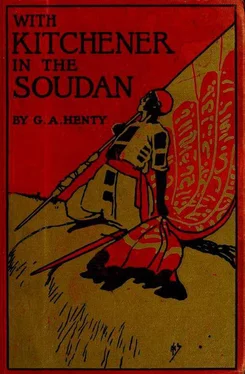" You may imagine our surprise when, after the fight was over," said Captain Keppel, " it was discovered that you were missing. No one could imagine what had become of you. One of the blacks who had been working your Maxim said they had not noticed your leaving them, and that when they found you were not there, they supposed you had come to confer with me. Then I sent for your man, but he too was missing. We searched everywhere, but no signs of you, dead or alive, and no marks of blood were to be found ; so it seemed that the matter must remain a mystery. Early the next morning, however, we saw a white rag Avaving on the bank, and then a black entered the water and swam out towards us. I sent the boat to meet him, and when he came on board I found that he was your man, and the mystery was explained. I fancy I used some strong language, for I never before heard of a man being so hare-brained as to spring overboard in the middle of a battle and pick up a woman without saying a word to anyone of what he was doing, and that with the boat still steaming ahead. Of course your man told us that it was Mahmud's wife you had saved, and that she had taken you under her protection, but I did not expect that among those fanatics your life would be spared. Now tell us all about your adventures, and how you got down here just in time to see our fellows enter in triumph. I suppose you managed to give them the slip somehow?"
Gregory then told his story. When he had concluded, Captain Keppel said: "Well, you have the luck of the old one! First you have got hold of as faithful a fellow as is to be found in all Egypt or anywhere else, and in the second place you have been in the battle of Atbara, while we have been kicking our heels here and fuming at being out of it altogether, except for our bloodless capture of Shendy. So you say the Sirdar blew you up? I am not surprised at that. You know the story of the man who fell overboard in the old flogging days, and the captain sentenced him to two dozen lashes for leaving the ship without orders."
" I don't think he was really angry, for when I went to him the next evening he was a good deal milder. Of course he did say again that I had done wrong, but not in the same tone as before; and he seemed a good deal interested in what I told him about Mahmud, and how my boy had risked his life to rescue me and had succeeded almost by a miracle. He said there is a lot of good in these black fellows if one could but get at it. They have never had a chance yet, but, given good administration and the suppression of all tribal feuds with a stern hand, they might be moulded into anything." " And are you coming back to us now, Mr. Hilliard?" " I have no idea. I don't suppose anything will be settled for a time. There is not likely to be much doing anyway, except on the railway, and even your gun-boats will have an easy time of it, as there is not an enemy left on this side of the sixth cataract. The Dervishes who escaped are pretty sure to cross the Atbara. There are enough of them still, when they rally, to beat off any attacks that might be made by our tribesmen from Kassala."
CHAPTER XIII
THE FINAL ADVANCE
A FEW days after the return of head-quarters to Berber, Mahmud was sent down-country, and Fatma was permitted to accompany him. She expressed to Gregory in touching terms her gratitude for what he had done for her.
" We have been of mutual assistance," said Gregory. " I have the same reason to be grateful to you as you have to thank me. I saved your life and you saved mine. You were very kind to me when I was a captive—I have done as much as I could for you since you have been with us; so we are quits. I hope you will be happy with Mahmud. We do not treat our prisoners badly, and except that he will be away from the Soudan, he will probably be more comfortable than he has ever been in his life."
Gregory was now employed in the transport department, and journeyed backwards and forwards with large convoys of camels to the head of the railway. The line was completed to Berber, but the officers charged with its construction were indefatigable, and as fast as the materials came up, it was pushed on towards the Atbara. Complete as had been the victory on that river, the Sirdar saw that the force which had been sufficient to defeat the twenty thousand men under Mahmud was not sufficiently strong for the more onerous task of coping with three times that number, fighting under the eye of the Khalifa, and certain to consist of his.best and bravest troops. He therefore telegraphed home for another British brigade and additional artillery, with at least one regiment of cavalry—an arm in which the Egyptian army was weak.
Preparations were at once made for complying with the request. The 21st Lancers, 1st battalion of Grenadier Guards, 2nd battalion of the Rifle Brigade, 2nd battalion of the 5th Lancashire Fusiliers, a field-battery, a howitzer-battery, and two forty-pounders to batter the defences of Omdurman should the Khalifa take his stand, were sent. A strong detachment of the Army Service Corps and the Royal Army Medical Corps was to accompany them, but they had yet some months to wait, for the advance would not be made until the Nile was full and the gun-boats could ascend the cataract. However, there was much to be done, and the troops did not pass the time in idleness. Atbara Fort was to be the base, and here the Egyptian battalions built huts and storehouses. The Soudanese brigades returned to Berber, and the transport of provisions and stores for them was thus saved. The British at Darmali were made as comfortable as possible, and no effort was spared to keep them in good health during the ensuing hot weather. A small theatre was constructed, and here smoking concerts were held. There was also a race meeting, and one of the steamers took parties of the men who were most affected by the heat for a trip down the Nile. They were practised in long marches early in the morning, and although, of course, there was some illness, the troops on the whole bore the heat well. Had there been a prospect of an indefinitely long stay the result might have been otherwise, but they knew that in a few months they would be engaged in even sterner work than the last battle, that Khartoum was their goal, and with its capture the power of the Khalifa would be broken for ever and Gordon avenged.
Early in April the railway reached Abadia, a few miles from Berber, and in a short time a wonderful transformation took place here. From a sandy desert, with scarce a human being in sight, it became the scene of a busy industry. Stores were sorted and piled as they came up by rail. Three gun-boats arrived in sections, and these were put together. They were stronger and much better defended by steel plates than the first gun-boats, and each of them carried two six-pounder quick-firing guns, a small howitzer, four Maxims, and a searchlight. They were, however, much slower than the old boats, and could do very little in the way of towing.
Besides these, eight steel double-deck troop barges were brought up in sections and put together. Three Egyptian battalions came up from Merawi to aid in the work, which not only included building the gun-boats and barges, but executing the repairs to all the native craft and putting them in a thoroughly serviceable state. In June the railway reached the Atbara, and for the first time for two years and a half the officers who had superintended its construction had a temporary rest. The stores were now transferred from Abadia to the Atbara, and two trains ran every day, each bringing up something like two hundred tons of stores. In the middle of July two Egyptian battalions left Atbara and proceeded up the Nile, one on each bank, cutting down trees and piling them for fuel for the steamers. As the river rose, four steamers came up from Dongola, together with a number of sailing boats, and in the beginning of August the whole flotilla, consisting of ten gun-boats, five unarmed steamers, eight troop barges, and three or four hundred sailing boats, were all assembled.
Читать дальше












